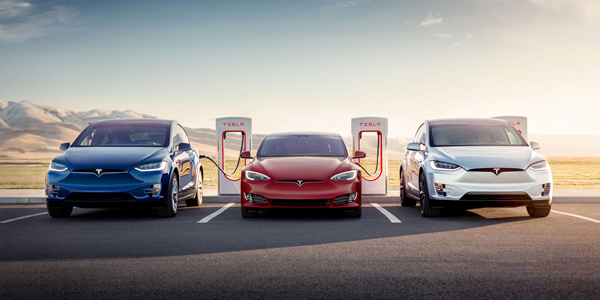By Amanda Durish Cook
Electric vehicle experts last week descended on the Illinois Commerce Commission to discuss the eventual adoption of EVs in the state and the need to manage customers’ charging patterns to avoid stressing the grid.
The ICC held the policy session in Chicago to learn more about the relationship between EVs and the grid. Panelists agreed that widespread EV adoption is years away and said state policymakers will eventually devise ways to stagger charging.
Illinois now has 15,000 EVs, with 100,000 projected to be on the road in the coming years, said Katie Bell, Tesla’s energy policy and business development manager. A recent study by the Illinois PIRG Education Fund and Frontier Group predicted Chicago will have 81,000 EVs by 2030. The ICC predicts that widespread EV adoption could bring Illinois up to $43 billion in benefits by 2050, “stemming from reduced utility bills, carbon pollution and fuel and vehicle expenses.”
Bell said Tesla is working to make its cars more affordable and examining how to site new charging stations, as well as ways to encourage owners to charge during off-peak hours.
“We’re trying to give customers a better option than what’s available today,” Bell said.
EVs are expected to drive 54% of new car sales by 2040, according Bloomberg. The ICC says that Illinois currently ranks sixth in the nation in terms of numbers of plug-in EVs.
“Currently, Illinois’ framework is light in that it doesn’t heavily regulate electric vehicles,” said energy attorney Elizabeth McErlean of law firm McGuireWoods.
McErlean said the question still remains whether EV charging station owners should be regulated as public utilities, though the Illinois General Assembly in 2012 exempted station owners from the definition of utilities. With Illinois keeping regulations light to encourage the development of private EV charging stations, McErlean said charging providers can grow unfettered and experiment to find best practices.
“Fossil fuels have enormous impact on our climate and health,” said Christie Hicks, manager of clean energy implementation for the Environmental Defense Fund. “Electric vehicles offer the greatest emissions reduction in the transportation sector. … It’s not a matter of when electric vehicles are coming, but how. … The future is electric.”
But Hicks acknowledged that fears of low travel range, scarce inventory and high upfront costs remain a barrier to widespread adoption.
Citizens Utility Board Executive Director Dave Kolata said there’s “a lot of momentum for transportation electrification.” He noted that charging patterns must be optimized, and that if all EV owners charge at night when wind generation creates negative electricity prices, it will eventually create a new peak. Kolata said he supported using time-of-use rates for charging and predicted that EVs will ultimately be automated to respond to price signals while charging.
When Illinois Senior Assistant Attorney General Susan Satter asked the room who owned an EV, she was greeted by a show of four or five hands.
“I have an EV,” Satter said. “Eighty percent of charging is done at home, in the garage. When we talk about charging stations, we’re talking about filling in for the times when we’re not at home.”
Satter said consumers have a lot of options for the fill-in charges: employers, city-owned free or low-cost charging stations, and stations placed at shopping centers to attract customers. Satter said states must be careful of developing policies that only consider utilities’ charging projects.
“We’re at the beginning of the EV revolution,” she said.
Satter said the growing number of EV owners will increasingly need to understand energy pricing and peak demand in order to select the lowest-price charging times. Panelists generally agreed EV owners will eventually need to be pushed to charge at off-peak times to avoid stressing the grid.
Satter pointed out that EV owners are still early adopters that earn well above the national median income and cautioned utilities about providing these owners incentives when they’re already high earners.
“What is an incentive? It’s giving people more money,” Satter said. “When we get past the early adopters and into the mass market, it’s going to be cheaper.”
Other panelists urged policymakers to be cognizant that EV owners today tend to be wealthier and less in need of subsidies.
“Many of the communities that stand to benefit the most from electric vehicles don’t have access to them,” Hicks said. She urged policymakers to subsidize charging stations and develop more local pilot programs.
Kolata agreed that incentives for EV adopters should not come at the cost of other economic classes of customers.
But Ryan Schonhoff, Ameren supervisor of rates, said lack of a “holistic charging system” is hindering growth of EVs.
Chicago Transit Authority analyst Kate Tomford said a solar and storage combination could work well in the city’s bus garages. She said that while the city owns two electric buses now, it plans to have a fleet of 20 in the “near future.”
Commonwealth Edison Vice President of Regulatory Policy and Strategy Jane Park said EVs in the U.S. are set to reach cost parity with internal combustion engine vehicles in seven years and credited growing popularity with “a confluence of technology advancements and national and internationally policy.” States with the highest EV adoption offer a “portfolio” of purchase incentives, dynamic pricing programs, infrastructure plans and a plan for access for low-income communities, she said.
Park said it’s not quite the time to place strict regulations on EV ownership because policymakers don’t yet understand how to strike the best balance of regulations.






